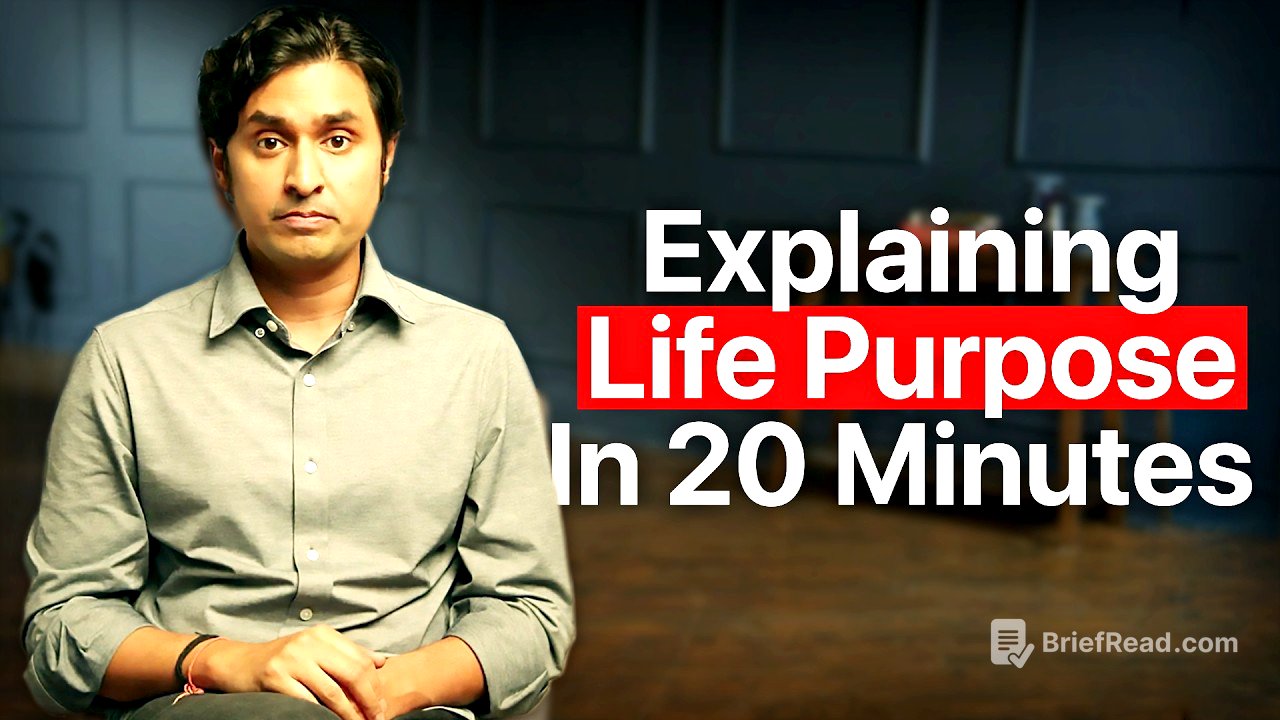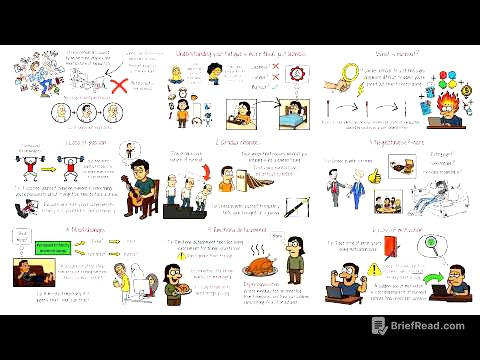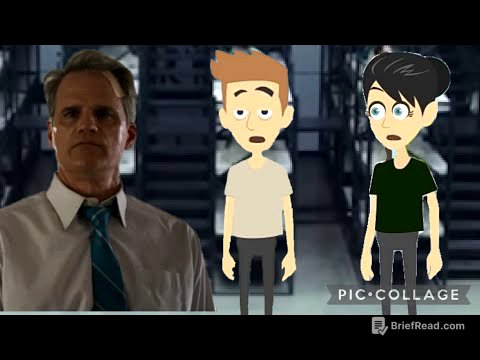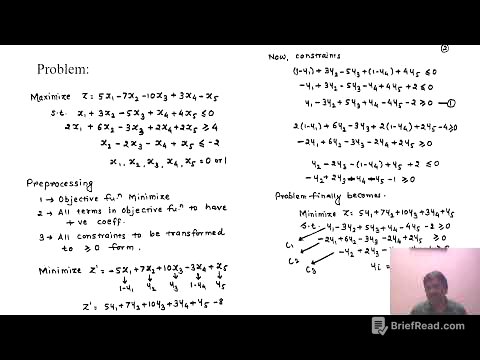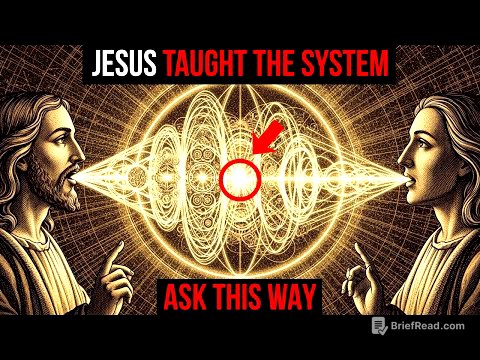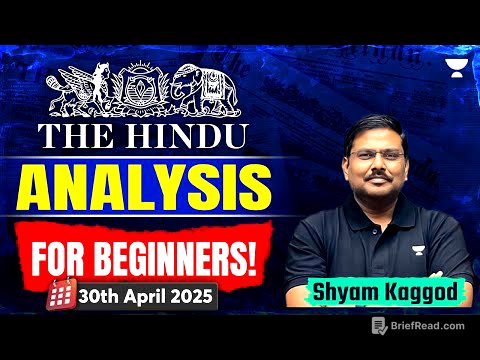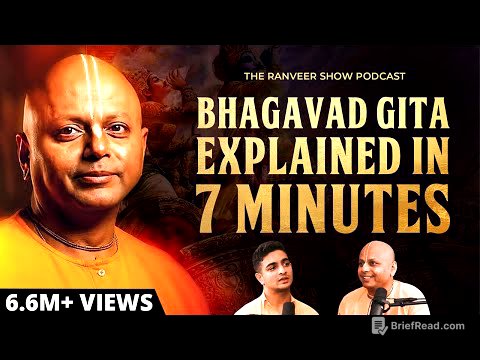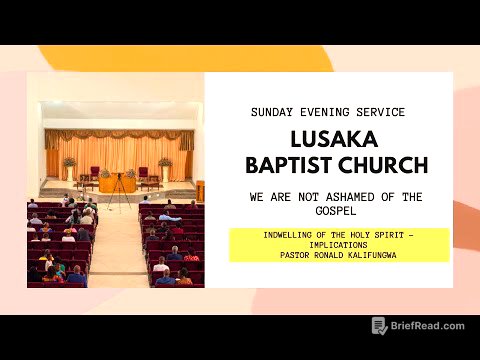TLDR;
This video explores how to find meaning and purpose in life using evidence-based approaches. It highlights that purpose is an internal feeling that can be quantified and crafted through actions, not merely found. The video introduces self-determination theory, emphasising the importance of making choices, stretching one's capacity, and relatedness. It also discusses the perception of control through balancing active and passive challenges, the role of purpose in overcoming addiction, and techniques like dereflection and paradoxical intention to find meaning.
- Purpose is an internal feeling, quantifiable, and crafted through actions.
- Self-determination theory highlights making choices, stretching capacity, and relatedness.
- Balancing active and passive challenges enhances the perception of control.
- Dereflection and paradoxical intention are techniques to find meaning.
Introduction [0:00]
The video introduces the topic of meaning and purpose in life, prompted by a discussion on the Diary of a CEO podcast. The speaker aims to justify claims made during the podcast and present an evidence-based approach to finding purpose, distinguishing it from philosophical debates. The speaker frames finding meaning and purpose as a practical endeavour.
Purpose is an Internal Feeling [1:16]
A sense of purpose is internally felt and not directly correlated with external factors like money or status. People with successful careers and families may still lack a sense of purpose, while those in difficult circumstances, such as being homeless or in jail, may still feel purposeful. This internal feeling is the primary indicator of purpose.
Purpose is Quantifiable [2:03]
Purpose is quantifiable, meaning individuals can experience varying degrees of it. Most people feel they have "some" purpose rather than a definitive yes or no. This suggests that purpose can be measured as a percentage in one's life.
Purpose is Not Something You Find [2:35]
Purpose is not something to be found externally but is internally crafted through a series of actions. The common notion of "finding" purpose implies it's binary and comes from outside oneself, like discovering it through external experiences or watching videos. Instead, it's an ongoing process of internal development.
Self-Determination Theory [3:12]
Self-determination theory explains how people develop a sense of purpose and direction. Research compares individuals who feel purposeful with those who do not, identifying key differences in their lives. The theory highlights that people with purpose make choices, while those without purpose have choices made for them. Meaning, purpose, and direction are overlapping concepts that evoke a similar internal feeling.
Make Choices for Yourself [5:39]
Making choices is crucial for developing a sense of purpose. People often struggle because they seek external validation to determine the "right" choice. Self-determination theory suggests that making any choice for oneself, regardless of external value, increases the internal sense of control, direction, and purpose.
Stretch Your Capacity [6:16]
Stretching one's capacity is another key aspect of self-determination theory. People who lack meaning often try to exert minimum effort and live efficiently to avoid burnout. Conversely, those with purpose stretch their capabilities, pushing beyond their comfort zones. This helps improve confidence and self-esteem, even if they fail. Pushing oneself leads to personal growth and a stronger sense of self.
Relatedness [9:14]
Relatedness involves being one's authentic self and having that self recognised and responded to by others. This is challenging in a world where people are easily replaceable and genuine connection is difficult to achieve. Socialising and connecting with others are essential for fostering this sense of relatedness, which is hard to do in isolation.
The Perception of Control [10:29]
People with purpose feel in control, while those without purpose feel out of control. The brain perceives control through the balance of active and passive challenges. Passive challenges are unavoidable difficulties, while active challenges are difficult tasks one chooses to undertake. The sense of control is based on the ratio of active to passive challenges, not the absolute number of challenges. Taking on more active challenges, even when life feels overwhelming, improves the perception of control and empowers the brain to handle passive challenges more effectively.
Addiction & Lack of Purpose [15:22]
A core vulnerability of all addictions is a lack of purpose and meaning in life. A strong reason is needed to overcome withdrawal or resist instant gratification. The speaker's goal is to help people with modern problems like technology addictions, lack of motivation, burnout, and imposter syndrome by teaching principles and practical techniques.
Obstacles to Change [16:38]
People often face obstacles when trying to implement changes, including internal conflicts, emotional blocks, and difficulty framing and following through with goals. These issues arise from setting goals based on momentary feelings and lacking the motivation to achieve them. A coaching program was developed to help individuals make choices, stretch their capacities, and overcome internal resistance, increasing their sense of purpose.
2 Ways to Find Purpose [19:20]
Two techniques from Victor Frankl are presented to help find purpose. These methods are dereflection and paradoxical intention.
Dereflection [19:47]
Dereflection involves stepping back from hyperfocusing on oneself and one's problems. By zooming out and looking at the big picture, individuals can see their experiences as part of a broader life narrative. This helps in finding meaning and purpose by understanding that current struggles are temporary and can lead to personal growth.
Paradoxical Intention [21:58]
Paradoxical intention involves looking forward to the things one dreads. Avoiding problems often leads to the feared outcome becoming a self-fulfilling prophecy. By changing one's mental attitude and facing dreaded tasks, individuals can take control of their lives and learn how to manage anxiety. This approach helps in finding meaning and purpose by turning challenges into opportunities for growth and empowerment.
